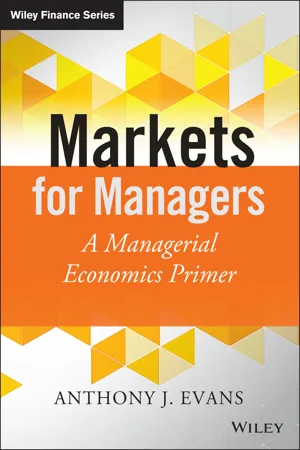
Markets for Managers
A Managerial Economics Primer
Anthony J. Evans
- English
- ePUB (mobile friendly)
- Available on iOS & Android
Markets for Managers
A Managerial Economics Primer
Anthony J. Evans
About This Book
An accessible text that provides managers with a well-rounded economic awareness
Successful managers possess an understanding of economic and market principles as they relate to business itself. Markets for Managers presents managerial economics in a casual, accessible format that will help management professionals take economic realities into account when running their companies or divisions. The book takes a global perspective while covering the full range of micro- and macroeconomic principles that managers around the world need to know. Complete with online resources that include further reading and a YouTube playlist, this guide puts business management practice within its economic context to produce a practical tool for managers.
By understanding market operation and what might cause market failure, management professionals can lead companies that respond to market pressures and align operating strategies with economic realities. Monetary and fiscal policies affect businesses of all sizes, and in Markets for Managers, business leaders can learn how to read the ever-shifting fiscal landscape.
- Delivers market information tailored to managers and the managerial decision-making process
- Comprehensively explains macro- and microeconomic ideas in language that's accessible
- Provides concrete suggestions for utilizing market knowledge to improve internal operations and align incentives
- Helps managers build a global view of business for optimal decision making
The practical format of Markets for Managers is perfect for professionals and students who want to gain an applied perspective on today's most pressing economic issues.
Frequently asked questions
CHAPTER 1
Incentives Matter
‘The theory of economics does not furnish a body of settled conclusions immediately applicable in policy. It is a method rather than a doctrine, an apparatus of mind, a technique of thinking which helps its possessor to draw correct conclusions.’—John Maynard Keynes1
1.1 MANAGERIAL INDIVIDUALISM
- Who made the bad decision?
- Did they have the information they needed?
- Did they have the right incentives?
- The rationality assumption – incentives affect behaviour (at the margin)The idea that incentives matter seems obvious but is often counterintuitive. My brother-in-law enjoys adventure and on a recent skiing trip realised that he was travelling faster than 30mph. My parents were worried that he might hurt himself if he crashed, so they bought him a helmet. Guess what? The next day he promptly reached 58mph! All safety equipment has a curious potential to backfire, because it alters your incentives to take risks. Although helmets mean that you are less likely to be injured if you have an accident, they also affect the probability of having an accident in the first place. In the case of skiing a helmet reduces the cost of an accident. All else being equal, this makes you more willing to risk having one. This may not be a large effect, and perhaps if you wore a helmet you'd think that you'd be just as careful as without. But the helmet is incentivising you to be more reckless, not less. Not only this, but it can affect other people's behaviour. If you wear a helmet you also reduce the cost to other people of them crashing into you. At the margin, it could lead to more accidents.7Think of the difference between Rugby and American Football. Both are similar sports but one key difference is that the players of the latter wear helmets. Which one do you think has the most neck and spinal injuries? The obvious answer would be Rugby, because they don't wear hard protection.8 But because of this they face a higher cost of putting their head into a dangerous situation. Maybe they are less likely to enter tackles headfirst? Indeed not only do American Footballers face a higher rate of neck and head injuries, there are calls by some to ban helmets for this very reason.9 A 2013 book on the subject claimed that in 1999 the NFL paid compensation to retired players after accepting they had suffered brain damage.10 Since the year 2000 neurosurgeons have been warning the league that the sport was causing depression, dementia and brain damage.11
- The self-interest assumption – people pursue their own self-interestAgain, to economists this assumption is self-evident and trivial. Maybe we don't really know what other people's interests are. Either way, we put our own interests ahead of the interests of others. This does not imply that we are narrowly selfish. It doesn't mean that we're motivated by material possessions, or monetary gains. The welfare of your children, or colleagues, may be your primary goal. Your self-interest may well be altruistic. But it's what drives your economic decision making. As Gary Becker said,I have tried to pry economists away from narrow assumptions about self-interest. Behaviour is driven by a much richer set of values and preferences. Individuals maximise welfare as they conceive it, whether they be selfish, altruistic, loyal, spiteful, or masochistic.12